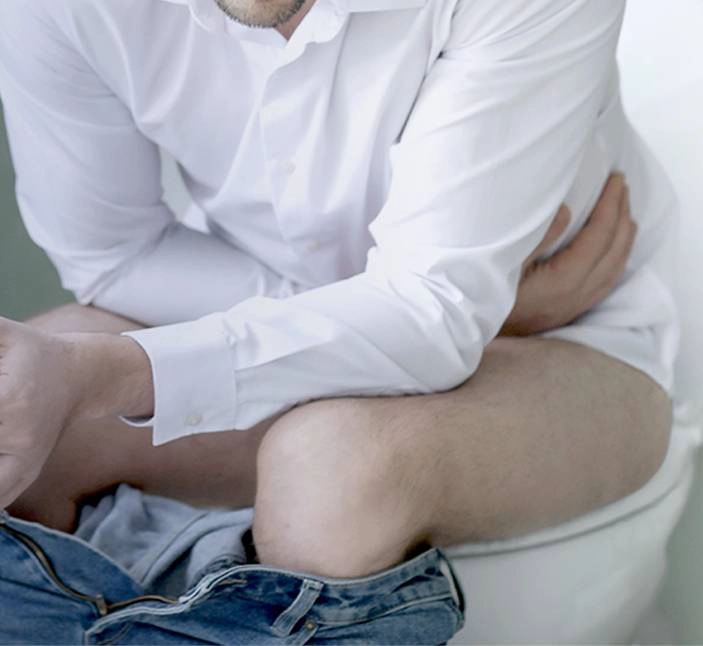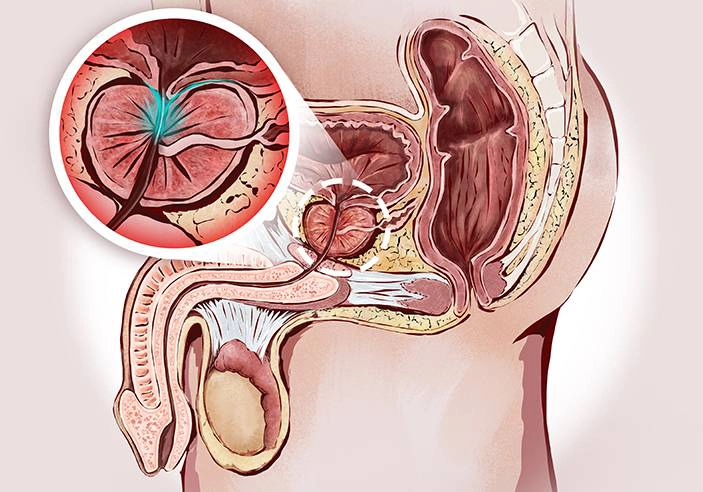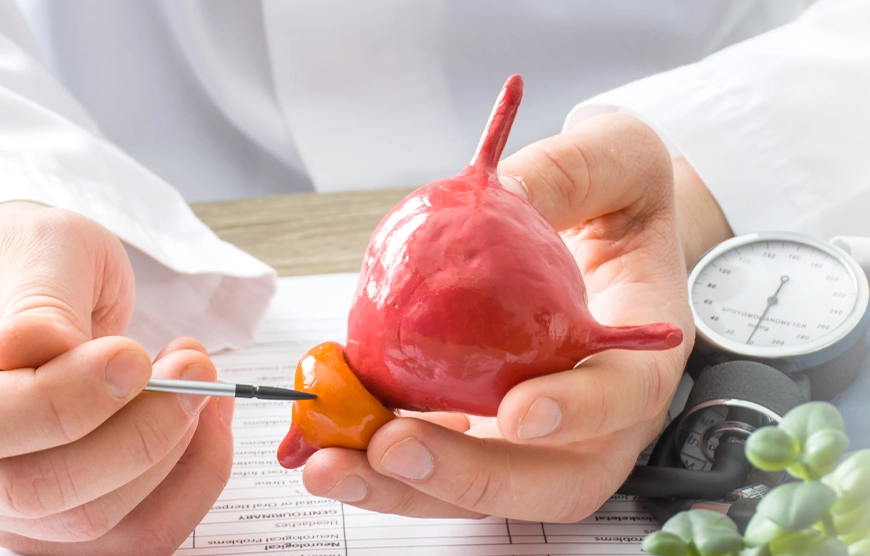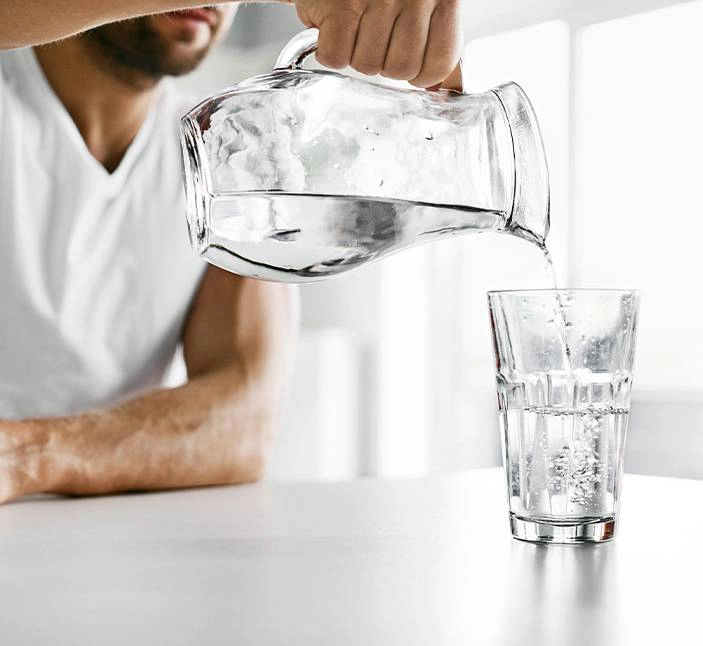What is Prostatitis
Prostatitis is swelling and inflammation of the prostate gland, a walnut-sized gland situated directly below the bladder in men. The prostate gland produces fluid (semen) that nourishes and transports sperm.

Symptoms of prostatitis
Prostatitis signs and symptoms depend on the cause. They can include:
- Pain or burning sensation when urinating (dysuria)
- Difficulty urinating, such as dribbling or hesitant urination
- Frequent urination, particularly at night (nocturia)
- Urgent need to urinate
- Cloudy urine
- Blood in the urine
- Pain in the abdomen, groin or lower back
- Pain in the area between the scrotum and rectum (perineum)
- Pain or discomfort of the penis or testicles
- Painful ejaculation
- Flu-like signs and symptoms (with bacterial prostatitis)
Prostatitis affects men of all ages but tends to be more common in men 50 or younger. The condition has a number of causes. Sometimes the cause isn't identified. If prostatitis is caused by a bacterial infection, it can usually be treated with antibiotics. Depending on the cause, prostatitis can come on gradually or suddenly. It might improve quickly, either on its own or with treatment. Some types of prostatitis last for months or keep recurring (chronic prostatitis).
What causes prostatitis?
Sexually transmitted infections (STIs) can turn into bacterial prostatitis. Unprotected sexual
intercourse can also let bacteria into the urethra (the urine passage between the bladder and the
tip of the penis), which can then move up to the prostate.
Other cases of bacterial prostatitis happen when there is a blockage at the outlet of the bladder.
Bladder outlet obstructions can cause urinary tract infections, which can then spread to the
prostate.
Other things that can make you more likely to develop prostatitis include diabetes, poor health,
or a weakened immune system.


How is prostatitis diagnosed?
Diagnosing prostatitis involves ruling out other conditions as the cause of your symptoms and determining what kind of prostatitis you have. Your doctor will ask about your medical history and your symptoms. He or she will also do a physical exam, which will likely include a digital rectal examination.
Initial diagnostic tests for prostatitis might include:
Urine and semen tests.
Your doctor might have a sample of your urine analyzed to look for signs of infection in your urine (urinalysis). Your doctor might also send a sample of your urine or semen to a lab to determine if you have an infection.Blood tests.
Your doctor might examine samples of your blood for signs of infection and other prostate problems.Post-prostatic massage.
In rare cases, your doctor might massage your prostate and test the secretions.Imaging tests.
In some cases, your doctor might order a CT scan of your urinary tract and prostate or a MRI of your prostate.- Based on your symptoms and test results, your doctor might conclude that you have one of the following types of prostatitis:
Acute bacterial prostatitis.
Often caused by common strains of bacteria, this type of prostatitis generally starts suddenly and causes flu-like signs and symptoms, such as fever, chills, nausea and vomiting. It’s the easiest kind of prostatitis to diagnose and treat, although it can become serious if not dealt with quickly.Chronic bacterial prostatitis.
When antibiotics don't eliminate the bacteria causing prostatitis, you can develop recurring or difficult-to-treat infections. Between bouts of chronic bacterial prostatitis, you might have no symptoms or only minor ones.Chronic prostatitis/chronic pelvic pain syndrome.
This is the most common type of prostatitis, when the prostate is inflamed, but there isn’t any bacteria present. Often an exact cause can't be identified. For some men, symptoms stay about the same over time. For others, the symptoms go through cycles of being more and less severe. Symptoms can disappear and come back later, and are often made worse by stress.Asymptomatic inflammatory prostatitis.
This type of prostatitis doesn't cause symptoms and is usually found only by chance when you're undergoing tests for other conditions. It doesn't require treatment.

Treatment for prostatitis
Prostatitis treatments depend on the underlying cause. They can include:
-
Antibiotics.
This is the most commonly prescribed treatment for prostatitis. Your doctor will choose your medication based on the type of bacteria that might be causing your infection. - If you have severe symptoms, you might need intravenous (IV) antibiotics. You'll likely need to take oral antibiotics for four to six weeks but might need longer treatment for chronic or recurring prostatitis.
-
Alpha blockers.
These medications help relax the bladder neck and the muscle fibers where your prostate joins your bladder. This treatment might ease symptoms, such as painful urination. -
Anti-inflammatory agents.
Nonsteroidal anti-inflammatory drugs (NSAIDs) might make you more comfortable.
Lifestyle and home remedies
The following might ease some symptoms of prostatitis:
- Soak in a warm bath (sitz bath) or use a heating pad.
- Limit or avoid alcohol, caffeine, and spicy or acidic foods, which can irritate your bladder.
- Avoid activities that can irritate your prostate, such as prolonged sitting or bicycling.
- Drink plenty of caffeine-free beverages. This will cause you to urinate more and help flush bacteria from your bladder.
- Avoiding anything that gives you constipation, because large, hard bowel movements can press on the sore prostate and be quite painful.

Complementary medicine
Complementary therapies that show some promise for reducing symptoms of prostatitis include:
Biofeedback.
A biofeedback professional/physiotherapist uses signals from monitoring equipment to teach you to control certain body functions and responses, including relaxing your pelvic floor muscles.Acupuncture.
This involves inserting very thin needles through your skin to various depths at certain points on your body.Herbal remedies and supplements.
There's no evidence that herbs and supplements improve prostatitis, although many men take them. Some herbal treatments for prostatitis include rye grass (cernilton), a chemical found in green tea, onions and other plants (quercetin) and extract of the saw palmetto plant.
How can prostatitis affect my life?
Prostatitis can be very painful. If you’re unsure about whether the condition can be treated, this can
lead to feelings of depression and hopelessness. Prostatitis can also lower your sex drive, because the
pain can make it hard to enjoy sexual activity.
Reaching out to family and partners for support can help in dealing with ongoing prostatitis. Although it
can be an unpleasant condition,
there are treatments that can help with the symptoms.






